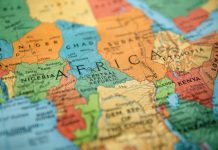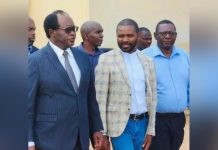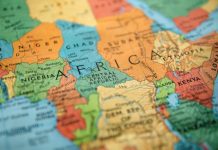Africa-Press – Zambia. Foreign media reports that the Zambian government has resolved to completely shut down access to the internet beginning next Thursday, the voting day.
According to a highly placed government source, access to the internet will be throttled from Thursday in an effort to maintain peace and order during the voting period. The source that opted to remain anonymous said the decision has since been communicated to ZICTA for implementation.
“Yes internet will go down from Thursday. There will be a total blackout. We will start to slowly restore access around Saturday in selected areas, we may get full access maybe on Sunday or Monday, depending on the situation,” the source said.
The source added that President Lungu has sanctioned the move as a way to counter any possible unrest that may emerge when results start trickling in.
“There is fear that some negative elements might use the internet to incite and organize protests and this is why we are shutting it down all together,” the source stated.
And Head of Public Policy at Facebook, Southern Africa, Nomonde Gongxeka-Seopa has urged the Zambian government to keep internet open during the election period.
Ms. Gongxeka-Seopa said in an interview with Hot FM from South Africa that Facebook has been engaging the Zambian authorities on the importance of keeping internet access open.
“We know that we rely on social media platforms to communicate and if there is Internet shutdowns, it separates people from reaching out to their families and friends and even their livelihoods and speaking of livelihoods, we know that with the advent of Covid 19, most businesses have moved online to reach out to their customers, so if there is Internet shutdowns, it undermines economic activities and growth by harming small businesses and disrupting the whole start up eco system,” she said.
She added, “So for us, we hold the view that instead of ordering shutdowns and blocking access, perhaps authorities should seek to use and work with online platforms to address emerging issues through maintaining their own online presence and supporting appropriate culture speech.”
“For us as Facebook, we are happy to work with government and law enforcement to provide education and training on how to do this,” Ms. Gongxeka-Seopa said. Meanwhile, both MTN and Airtel have failed to offer guarantees that they will not shut down internet access over the election period.
MTN Group told the Daily Maverick that its subsidiaries, including MTN Zambia, respected digital human rights, including “the right to communicate, to share information freely and responsibly, and to enjoy privacy and security regarding their data and their use of digital communications”.
MTN said if the Zambian government ordered it to shut down its services during the elections, the company would have to consider the order in light of its digital human rights policy.
But MTN did not say that it would not shut down its services or censor them. And the company confirmed that it had shut down the internet in four other African countries recently during unrest.
“In all cases, restricting access to the internet is the last resort,” an MTN spokesperson said. UPND Secretary General Batuke Imenda
UPND Secretary-General Batuke Imenda told DM168: “We are disappointed that MTN and Airtel, as Zambia’s two biggest telecommunications providers, will not guarantee to protect internet access ahead of the general election on 12 August and stand up against any attempts by the government to infringe [on] the digital rights of citizens.”
“Combined access to data and internet connectivity is an essential requirement for a free, fair and credible election. There is a distinct possibility that the government will instruct Zambia’s telecommunications companies to shut down the internet in an attempt to subvert the democratic will of the people. Any throttling of the internet, blocking of social media/instant messaging platforms and internet shutdowns will compromise the freedom and fairness of the election.”
“Further, shutting down the internet is a violation of the fundamental rights and freedoms of citizens being contrary to Article (20) of the Constitution of Zambia. The tactics to shut down the internet is dictatorial and a serious indictment on freedom of expression.
“These tactics deny voters access to information about the election, including where and how to vote. Importantly, the government of Zambia is also aimed at preventing election monitors [including observation missions] from communicating and carrying out independent monitoring of the voting and counting process.”
“We call upon both MTN and Airtel to take a clear stance in support of human rights and democracy by declaring their opposition to any instruction to throttle or shut down the internet and block access to social media and instant-messaging platforms. They should furthermore indicate publicly what steps they will be taking to engage with government to pre-empt any unlawful instruction,” Mr Imenda said.
In response to questions about how it would respond if the Zambian government instructed it to black out signal over the election period, MTN said: “MTN Group believes that everyone deserves the benefits of a modern connected life and our priority is always to provide customers with full access to our network.” MTN endorsed the United Nations (UN) stance “that the rights held by people offline must also be protected online”.
“Our response to digital human rights is underpinned by a sound group-wide policy and due diligence framework. In all cases, restricting access to the internet is a last resort. Should MTN Zambia receive an instruction to shut down the internet, we would first have to check the terms of our licence and ensure that we comply with our licence conditions.”
MTN would review the directive against the group’s digital human rights policy and due diligence framework, guided by the UN Guiding Principles for Business and Human Rights framework.
“MTN was engaging with stakeholders, including industry players and regulatory authorities, to assess the likelihood of a potential request for an internet shutdown, to identify “potential mitigations” and “manage any potential situation as effectively as possible.”
“As part of our due diligence framework, MTN works to limit the scope, extent, or duration of any human rights impacts.”
DM168 asked MTN if it would comply with a request by the Zambian authorities to censor text messages to remove the names of opposition candidates, as cellular companies did during the recent Tanzanian elections.
MTN said it was “politically impartial in all its operations and does not subscribe to any political party, movement, or affiliation” but would evaluate such a request from either governmental or non-governmental bodies to see if the requests were legal.
“Even as a major player in many markets, we cannot presume that we can influence these events upfront,” MTN said, adding that it recognised it had a role of “advocating globally for respect of digital human rights”.
Asked if it would consider pulling out of Zambia if asked to shut or censor its transmission, the company said it would do “a robust risk assessment before any decision is taken to exit a market”, taking into account numerous factors, including human rights and stakeholders’ perspectives.
“Many of the markets in which MTN operates have the lowest mobile penetration rates globally. Investing in these markets allows MTN to provide vital communications services, ensuring people have access to basic and emergency services and a means of sharing information and staying connected.
“MTN’s presence enables people to realise their basic human rights. Notwithstanding, the risk of human rights incidents in our countries of operation exists. Such risks are a factor of doing business in these markets and these are not strictly limited to MTN.”
DM168 asked MTN for examples where it had shut down or censored communications for governments and why this was done. “In 2020, MTN received three major requests by authorities, legally permitted by applicable laws or by virtue of a court order, obliging MTN to block or suspend internet or social media services or websites.
“These were in Sudan, Guinea-Conakry and Nigeria, and these incidents took place during times of political or social unrest.
“As an example, in June 2020, Sudan experienced a month-long near-total internet shutdown due to unrest in the country. MTN Sudan followed the Group’s due diligence process, which included understanding the options available before making any decision to comply or reject the requests to shut down services. The process also considered the safety and security risks to employees, customers, and operations. MTN Sudan was commended by its customers for being one of the last operators to shut down and one of the first to reinstate services.”
“In late June 2021, during social unrest in Eswatini, MTN Eswatini received a directive from the communications regulator to shut down access to social media and online messaging platforms. After extensive engagements with all relevant stakeholders, MTN resumed the provision of full internet services nine days after complying with the directive.” With additional reporting from Daily Maverick







